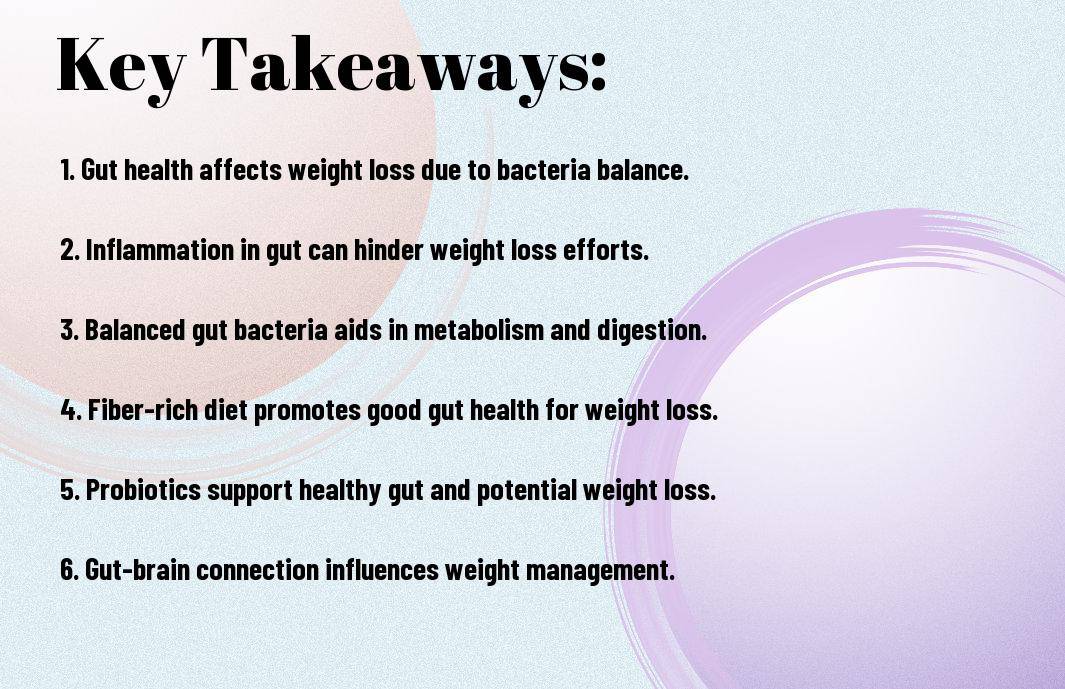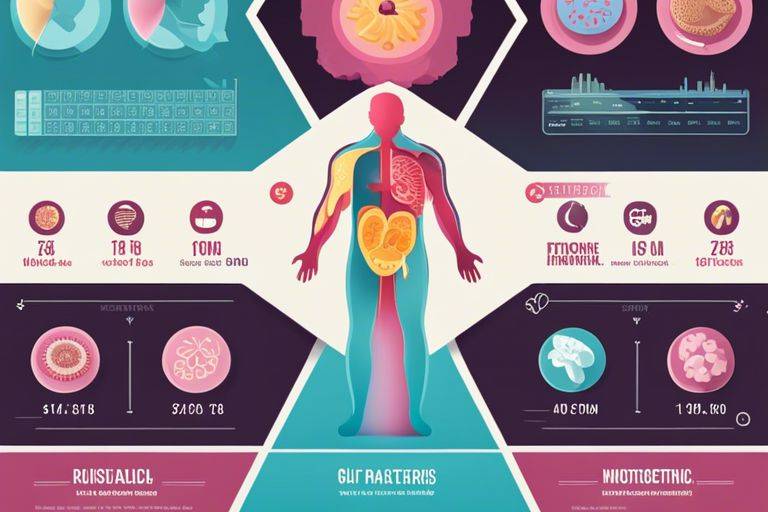As I examine into the world of wellness and nutrition, I can’t help but wonder about the intricate connection between gut health and weight loss. How does the state of our gut impact our weight and overall well-being? Join me as we explore the fascinating link between a happy gut and successful weight management. Let’s uncover the secrets to achieving a healthier weight through nurturing our gut microbiome and making informed dietary choices.

Key Takeaways:
- Gut bacteria can affect weight: The balance of bacteria in the gut can impact metabolism, inflammation, and how nutrients are absorbed, potentially influencing weight.
- Probiotics may help weight loss: Some studies suggest that probiotics can promote gut health and may aid in weight loss by improving digestion and reducing inflammation.
- Fiber is important for gut health and weight loss: High-fiber foods help nourish beneficial gut bacteria, regulate digestion, and promote feelings of fullness, which can aid in weight management.
- Leaky gut may contribute to weight gain: Increased intestinal permeability, or “leaky gut,” can lead to inflammation and potentially contribute to weight gain and other health issues.
- Stress and gut health are interconnected: Chronic stress can negatively impact gut health, leading to imbalances in gut bacteria and potentially affecting weight management.
- Processed foods can harm gut health: Diets high in processed foods, sugar, and unhealthy fats can disrupt the gut microbiome and may contribute to weight gain and other health problems.
- Individual responses vary: The relationship between gut health and weight is complex and can vary among individuals, highlighting the importance of personalized approaches to diet and lifestyle for weight management.

The Gut-Weight Connection
The Microbiome’s Role in Weight Regulation
The microbiome plays a crucial role in weight regulation. Your gut bacteria can influence how your body digests food, absorbs nutrients, and stores fat. By maintaining a healthy balance of gut flora, you can support proper metabolism and weight management.
How Gut Bacteria Affect Metabolism
With the right balance of gut bacteria, your metabolism can function optimally. Certain strains of bacteria can help regulate hunger hormones, improve insulin sensitivity, and reduce inflammation – all key factors in weight control. Ensuring a diverse microbiome through a balanced diet rich in fiber and fermented foods is necessary for a healthy metabolism.
Connection: The balance of bacteria in your gut can directly impact your body’s ability to process food and regulate weight. An imbalance in gut flora, known as dysbiosis, can lead to weight gain, insulin resistance, and inflammation – all of which are linked to obesity and chronic diseases.
I am excited to share this information with you as understanding the gut-weight connection can empower you to make informed choices that support both your gut health and weight management goals. Keep in mind, nourishing your gut with a variety of whole foods and probiotic-rich options is key to fostering a healthy microbiome and achieving a balanced weight.

The Impact of Gut Health on Weight Loss
Now, Beyond the Shots: Focusing on Gut Health Can Aid Weight Loss has shed light on the crucial role our gut plays in weight management. Inflammation and weight gain are intricately linked, with an unhealthy gut leading to chronic inflammation, which can hinder weight loss efforts.
Inflammation and Weight Gain
**Impact:** Chronic inflammation, often triggered by an imbalance in gut bacteria, can disrupt hormones responsible for regulating metabolism and appetite, leading to weight gain. By improving gut health through a balanced diet and lifestyle changes, you can reduce inflammation and support your weight loss journey.
The Gut-Brain Axis and Appetite Regulation
Inflammation from an unhealthy gut can interfere with the gut-brain axis, disrupting signals that control hunger and satiety. This can result in overeating and weight gain. By nurturing a healthy gut with **probiotic-rich foods** and fiber, you can improve communication between your gut and brain, aiding in appetite regulation.
Gut Health and Insulin Sensitivity
**Sensitivity:** A healthy gut is crucial for insulin sensitivity, which plays a key role in weight management. Imbalanced gut bacteria can lead to insulin resistance, making it harder for your body to regulate blood sugar and store fat efficiently. By promoting gut health through a diverse diet and **prebiotic foods**, you can enhance insulin sensitivity and support weight loss.

The Role of Diet in Gut Health and Weight Loss
Fiber-Rich Foods and Prebiotics
All the fiber-rich foods you eat not only support a healthy digestive system but also aid in weight loss. For optimal gut health, include plenty of fruits, vegetables, whole grains, and legumes in your diet. Prebiotics, found in foods like onions, garlic, and bananas, help feed the good bacteria in your gut, promoting a balanced microbiome.
Probiotics and Fermented Foods
Fermented foods like yogurt, kefir, sauerkraut, and kimchi are rich sources of probiotics, beneficial bacteria that support gut health. Including these foods in your diet can help maintain a diverse microbiome, which plays a crucial role in weight management and overall health.
Weight: Incorporating probiotics and fermented foods in your diet can aid in weight loss by promoting better digestion and absorption of nutrients. These foods also help reduce inflammation in the gut, which can contribute to weight gain.
Avoiding Processed and High-Sugar Foods
Steer clear of processed foods and those high in added sugars to maintain a healthy gut and support weight loss. These foods can disrupt the balance of bacteria in your gut, leading to inflammation and weight gain. Opt for whole, unprocessed foods to keep your gut happy and your weight in check.
Understanding: Eliminating processed and high-sugar foods from your diet is crucial for gut health and weight loss. These foods can negatively impact the diversity of your gut bacteria and contribute to conditions like obesity and metabolic disorders. Replace them with nutrient-dense whole foods to support a thriving microbiome and achieve your weight loss goals.
Gut Health and Hormones
The Gut-Thyroid Connection
Unlike other organs in the body, the gut plays a crucial role in regulating thyroid hormones. With imbalances in gut health, there can be disruptions in the production and conversion of thyroid hormones, leading to issues like hypothyroidism or hyperthyroidism.
Gut Health and Cortisol Levels
On the topic of gut health and cortisol levels, it’s imperative to recognize that the gut-brain axis plays a significant role in regulating stress hormones like cortisol. Imbalances in gut bacteria can lead to dysregulation of cortisol levels, potentially leading to issues like chronic stress and weight gain.
Plus, cortisol, often referred to as the “stress hormone,” can have a substantial impact on weight management. High levels of cortisol can lead to increased abdominal fat storage, making weight loss more challenging. By maintaining a healthy gut and managing stress levels, you can support optimal cortisol balance for overall well-being.
The Impact of Hormonal Imbalance on Weight
Cortisol, a key player in the body’s stress response, can have a profound impact on weight. For instance, chronic elevation of cortisol levels can lead to increased appetite, cravings for unhealthy foods, and the storage of visceral fat around the abdomen. These effects can make weight loss difficult and contribute to a higher risk of metabolic disorders.
Strategies for Improving Gut Health
Your The Link Between Gut Health and Obesity article probably gave you some insight into the imperative link between gut health and weight management. To improve your gut health and aid in weight loss, here are some strategies you can incorporate into your daily routine.
Increasing Fiber Intake
Any nutritionist will tell you that increasing your fiber intake is crucial for good gut health. Fiber-rich foods like fruits, vegetables, whole grains, and legumes help promote good digestion and keep your gut flora balanced, aiding in weight loss.
Incorporating Probiotic-Rich Foods
The key to a healthy gut lies in incorporating probiotic-rich foods like yogurt, kefir, sauerkraut, and kimchi into your diet regularly. These foods are rich in beneficial bacteria that can help improve digestion, boost your immune system, and aid in weight loss.
Understanding the importance of probiotics in your diet is crucial for maintaining a healthy gut and achieving weight loss goals. Including a variety of probiotic-rich foods in your meals can help balance the gut microbiome, leading to better overall health and weight management.
Managing Stress and Sleep
One of the often overlooked aspects of good gut health is managing stress and ensuring an adequate amount of sleep. Stress and poor sleep can disrupt the balance of bacteria in your gut, leading to digestive issues and weight gain. Taking steps to reduce stress levels and improve your sleep quality can significantly benefit your gut health and weight loss journey.
Another important aspect of maintaining gut health is managing stress levels and prioritizing quality sleep. **Stress** and lack of sleep can negatively impact your gut bacteria, leading to inflammation and weight gain. Making time for relaxation techniques and ensuring you get enough rest can have a positive impact on your gut health and overall well-being.
Common Gut Health Issues and Weight Loss
Leaky Gut Syndrome and Weight Gain
To address weight loss, it’s crucial to understand the impact of leaky gut syndrome. Leaky gut can lead to weight gain due to inflammation and improper nutrient absorption. The compromised gut lining allows toxins to enter the bloodstream, triggering immune responses that can disrupt metabolism and contribute to weight gain.
SIBO and Weight Loss Resistance
To combat weight loss resistance caused by Small Intestinal Bacterial Overgrowth (SIBO), focus on rebalancing gut bacteria. SIBO can lead to malabsorption of nutrients and disrupt metabolism, making weight loss challenging. By addressing the bacterial overgrowth through diet modifications and targeted treatments, you can overcome this hurdle in your weight loss journey.
Resistance: SIBO can create an environment where certain bacteria thrive, leading to bloating, nutrient malabsorption, and weight loss resistance. By rebalancing the gut flora through probiotics, dietary changes, and possibly antibiotics, you can restore gut health and improve weight management.
Candida Overgrowth and Weight Management
Syndrome: Candida overgrowth can hinder weight management by causing cravings for sugar and refined carbs, leading to weight gain. Additionally, the byproducts of Candida metabolism can disrupt gut health and hinder proper digestion and nutrient absorption.
Weight: To address Candida overgrowth, focus on eliminating sugar and processed foods from your diet to starve the yeast. Incorporate probiotics and antifungal foods like garlic and coconut oil to rebalance gut flora and support weight management efforts. Consulting with a healthcare provider can help create a personalized plan to address Candida overgrowth and promote healthy weight loss.
To wrap up
Drawing together the intricate relationship between gut health and weight loss has shed light on the importance of maintaining a balanced microbiome for overall well-being. As I’ve explored into the topic, I’ve learned how crucial it is to nourish your gut with probiotic-rich foods to support weight management. To further explore how supplements can aid in promoting gut health and weight loss, check out Can Supplements Help With Gut Health and Weight Loss?.
FAQ
Q: Is there a connection between gut health and weight loss?
A: Yes, there is a strong link between gut health and weight loss. An unhealthy gut can lead to weight gain and make it difficult to lose weight.
Q: How does gut health affect weight loss?
A: The gut plays a key role in digestion, absorption of nutrients, and metabolism. An unhealthy gut can lead to inflammation, insulin resistance, and hormonal imbalances, all of which can contribute to weight gain.
Q: What are some signs of poor gut health?
A: Some signs of poor gut health include bloating, gas, constipation, diarrhea, food intolerances, and frequent infections.
Q: How can I improve my gut health to aid weight loss?
A: You can improve your gut health by eating a diet rich in fiber, prebiotics, and probiotics, reducing stress, getting enough sleep, staying hydrated, and avoiding antibiotics and unnecessary medications.
Q: Can gut health supplements help with weight loss?
A: Gut health supplements like probiotics and digestive enzymes can support a healthy gut and aid weight loss, but they are not a replacement for a balanced diet and healthy lifestyle habits.
Q: What foods are good for gut health and weight loss?
A: Foods that are good for gut health and weight loss include fruits, vegetables, whole grains, lean proteins, nuts, seeds, yogurt, kefir, sauerkraut, and kimchi.
Q: How long does it take to see improvements in gut health and weight loss?
A: Improving gut health and losing weight is a gradual process that can take weeks to months to see significant results. Consistency with healthy habits is key for long-term success.



